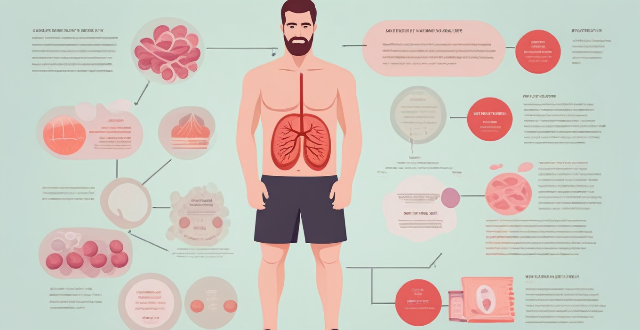Disease Immune

How does consistent physical activity affect the immune system in relation to chronic disease prevention ?
The article discusses the impact of consistent physical activity on the immune system and its role in preventing chronic diseases. It explains that regular exercise can increase the number and activity of immune cells, reduce inflammation, and improve overall health. The article also provides recommendations for exercise and emphasizes the importance of incorporating physical activity into one's lifestyle to prevent chronic diseases and improve well-being.

Can exercise boost the immune system ?
Exercise can indeed boost the immune system through various mechanisms, including enhanced circulation, reduced inflammation, weight management, stress reduction, improved sleep, increased self-esteem and mental health, microbiome diversity, temperature regulation, prevention of chronic diseases, and social interaction. Regular moderate exercise is generally considered beneficial for the immune system, but it's essential to consult with healthcare professionals to determine the appropriate amount and intensity of exercise for individual needs and circumstances.

How do vaccines work to protect against disease ?
Vaccines protect against disease by introducing a small amount of the pathogen into the body, triggering the immune system to produce antibodies that protect against future infections with the same pathogen. There are several types of vaccines with unique mechanisms of action and effectiveness against specific pathogens. The development of vaccines is a complex process requiring extensive testing and research, but they have been shown to be highly effective at preventing serious diseases.

Can vaccines be used to treat cancer or other non-infectious diseases ?
Vaccines are traditionally used to prevent infectious diseases by stimulating the immune system to recognize and attack specific pathogens. The possibility of using vaccines for the treatment of cancer or other non-infectious diseases is being explored, with a focus on modulating the immune response rather than stimulating it. Cancer vaccines, including preventive and therapeutic types, aim to stimulate the immune system to recognize and destroy tumor cells. For autoimmune diseases, researchers are exploring ways to use vaccines to dampen overactive immune responses or retrain the immune system. Vaccines are also being investigated for their potential in treating other chronic diseases such as Alzheimer's and heart disease. While promising, the application of vaccines in treating non-infectious diseases faces significant challenges, including identifying unique targets and balancing immune responses. Advancements in immunology and vaccine technology offer hope for new treatments that could benefit millions worldwide.

Is it true that certain superfoods can boost your immune system ?
Incorporating superfoods like citrus fruits, garlic, ginger, spinach, yogurt, nuts and seeds, blueberries, and turmeric into your diet can help support immune health by providing key nutrients such as vitamin C, vitamin D, zinc, protein, and antioxidants. These foods offer a range of benefits including boosting white blood cell production, reducing inflammation, supporting digestive health, and protecting against oxidative stress. However, it's important to maintain a balanced diet and lifestyle for overall immune support.

Can excessive training have negative effects on the immune system ?
Excessive training, or overtraining, can have negative effects on the immune system. Regular exercise enhances immune function by stimulating antibody and white blood cell production, reducing inflammation, and improving circulation. However, excessive training can cause chronic inflammation, oxidative stress, and hormonal imbalances that suppress immune function. Signs of overtraining syndrome include chronic fatigue, mood changes, and increased susceptibility to illness. To prevent overtraining and maintain immune health, individuals should follow a balanced training program, prioritize sleep, eat a nutrient-rich diet, and manage stress levels.

How does regular exercise contribute to boosting the immune system ?
Regular exercise has numerous health benefits, including boosting the immune system. It promotes increased blood circulation, reduces inflammation, helps in weight management, reduces stress, improves sleep quality, enhances gut health, increases antioxidant capacity, supports cardiovascular health, enhances mental health, and contributes to increased longevity. Incorporating regular physical activity into your lifestyle can support a strong and resilient immune system.

How can I improve my diet to boost my immune system ?
Improving your diet is one of the best ways to boost your immune system. Here are some tips on how you can do that: ## Eat a Variety of Foods Eating a variety of foods ensures that you get all the essential nutrients your body needs. This includes fruits, vegetables, whole grains, lean proteins, and healthy fats. Aim for at least five servings of fruits and vegetables per day. ### Fruits and Vegetables - Apples - Bananas - Berries - Broccoli - Carrots - Spinach ### Whole Grains - Oats - Quinoa - Brown Rice ### Lean Proteins - Chicken breast - Fish (such as salmon or tuna) - Legumes (such as lentils or chickpeas) ### Healthy Fats - Avocados - Nuts (such as almonds or walnuts) - Seeds (such as chia or flaxseed) ## Stay Hydrated Drinking enough water is crucial for maintaining a healthy immune system. Aim for at least eight glasses of water per day, and more if you're active or it's hot outside. You can also stay hydrated by drinking herbal teas or eating water-rich foods like cucumbers, melons, and strawberries. ## Limit Processed Foods and Sugary Drinks Processed foods and sugary drinks can weaken your immune system by causing inflammation in your body. Try to limit these foods and drinks as much as possible, and opt for whole, nutrient-dense foods instead. ## Consider Taking Supplements If you're not getting enough vitamins and minerals from your diet, consider taking supplements. Some common supplements that may help boost your immune system include vitamin C, vitamin D, zinc, and probiotics. However, be sure to talk to your doctor before starting any new supplements.

Is there a specific duration or intensity of exercise needed to improve immune function ?
The relationship between exercise and immune function is complex, but research suggests that regular physical activity can enhance the immune system. However, both the duration and intensity of exercise play significant roles in achieving this beneficial effect. The American Heart Association recommends at least 150 minutes of moderate-intensity aerobic activity or 75 minutes of vigorous-intensity activity per week for adults. Engaging in prolonged periods of endurance exercise can temporarily suppress immune function due to increased stress on the body. Light activities like walking or yoga can still offer immune benefits by reducing stress and promoting overall health. Regular moderate to high-intensity exercises, such as jogging, cycling, or strength training, are generally considered optimal for enhancing immune function. Adequate rest and recovery are crucial for maintaining a healthy immune system. Combining different types of exercises (aerobic, strength training, flexibility work) can provide a well-rounded approach to enhancing immune function. Staying hydrated and consuming a balanced diet rich in nutrients supports both exercise performance and immune health. Other lifestyle habits, including sleep quality, stress management, and avoidance of harmful substances, also play a vital role in supporting immune function alongside exercise.

Can exercise reverse heart disease ?
Heart disease is a major cause of death worldwide, and it can be devastating to those affected. While there are many treatments available for heart disease, including medication and surgery, some people wonder if exercise can reverse the damage caused by heart disease. There is evidence that regular exercise can help prevent and manage heart disease by improving cardiovascular health, managing weight, lowering blood pressure, improving cholesterol levels, and reducing stress. However, there is no conclusive evidence that exercise can completely reverse heart disease. Despite this, there are still many benefits to regular exercise for heart health. If you have been diagnosed with heart disease or are at high risk for developing it, talk to your doctor about starting an exercise program. They can help you create an exercise plan that is safe and effective for your individual needs and goals.

What are some good gluten-free food options for people with celiac disease ?
Celiac disease is an autoimmune disorder that damages the small intestine and requires a strict gluten-free diet. Good gluten-free food options for people with celiac disease include fruits and vegetables, meat and fish, gluten-free grains and starches like quinoa and brown rice, dairy products, nuts and seeds, gluten-free flours and baking mixes, and gluten-free snacks and beverages like popcorn and juices.

How does climate change influence the distribution and survival of disease-carrying organisms ?
This text discusses the influence of climate change on the distribution and survival of disease-carrying organisms, highlighting how altered habitats, changes in reproduction and life cycle, and altered behavior and transmission rates contribute to the spread of diseases. It further provides examples of specific disease-carrying organisms affected by climate change and suggests mitigation strategies such as surveillance, control measures, public health education, and research to address these challenges.

How does predictive analytics help in disease prevention and management within the healthcare system ?
Predictive analytics in healthcare can significantly improve disease prevention and management by identifying patterns and trends in patient data. It offers benefits such as early intervention, personalized treatment plans, enhanced operational efficiency, and informed decision-making. Applications include disease surveillance, chronic disease management, and patient care optimization. However, challenges like data privacy, quality, and the need for skilled data analysts must be addressed to fully realize its potential.

Does high-intensity interval training (HIIT) have specific benefits for chronic disease prevention ?
High-intensity interval training (HIIT) offers numerous benefits for chronic disease prevention, including improved cardiovascular health, enhanced glucose control, reduced inflammation, increased muscle mass and strength, and improved mental health outcomes. To incorporate HIIT into a healthy lifestyle, start slowly, choose the right exercises, include other forms of exercise, and consult with a health professional.

How much exercise is needed per week to prevent chronic disease ?
Chronic diseases are a major cause of death and disability worldwide. Regular physical activity can help reduce the risk of developing chronic diseases such as heart disease, diabetes, and some types of cancer. According to the World Health Organization (WHO), adults should aim to do at least 150 minutes of moderate-intensity aerobic exercise or 75 minutes of vigorous-intensity aerobic exercise each week, along with muscle-strengthening activities at least twice a week. However, the amount of exercise needed to prevent chronic diseases may vary depending on individual factors such as age, sex, body weight, and overall health status. It's recommended that people try to incorporate at least 30 minutes of moderate-intensity aerobic exercise into their daily routine, along with strength training exercises whenever possible.

Can exercise reverse or slow the progression of existing chronic diseases ?
**Can Exercise Reverse or Slow the Progression of Existing Chronic Diseases?** Chronic diseases like diabetes, heart disease, and cancer often require lifelong management. Many wonder if exercise can play a role in mitigating these conditions. This discussion explores the potential benefits of physical activity for those with chronic illnesses. **Benefits of Exercise for Chronic Diseases:** - **Cardiovascular Disease**: Improved blood pressure, reduced risk of heart attack, enhanced lipid profile. - **Diabetes**: Better blood sugar control, aid in weight management, reduced complications. - **Cancer**: Improved quality of life, reduced fatigue, potentially better survival rates. **How Exercise Contributes to These Benefits:** - Increased blood flow ensures better organ oxygenation and nutrient delivery. - Anti-inflammatory effects alleviate symptoms of chronic diseases. - Boosted immune function helps fight infections and potentially cancer cells. **Implementing an Exercise Program:** - **Consultation**: Always consult your healthcare provider before starting. - **Gradual Progression**: Start slowly and build up over time. - **Balanced Routine**: Include cardio, strength training, and flexibility exercises. - **Monitoring Response**: Track how your body responds to different exercises. **Conclusion:** While exercise might not reverse chronic diseases outright, it significantly slows their progression and enhances well-being. Tailoring an exercise program under medical guidance allows those with chronic conditions to actively manage their health, improving their quality of life.

Can regular physical activity prevent age-related diseases ?
The text discusses the potential of regular physical activity to prevent age-related diseases, highlighting its numerous benefits such as improved cardiovascular health, enhanced immune function, better bone density, reduced inflammation, and improved mental health. It further elaborates on how these benefits can specifically prevent or delay the onset of diseases like cardiovascular diseases, diabetes, osteoporosis, cancer, and dementia. The conclusion emphasizes that while regular physical activity can play a significant role in preventing age-related diseases, it should be part of a comprehensive approach to health that also includes a balanced diet, adequate sleep, and stress management.

What are the potential health risks associated with global warming ?
Global warming, caused by human activities, poses various health risks including heat-related illnesses like heatstroke and dehydration, spread of diseases such as malaria and Lyme disease, respiratory problems including asthma and allergies, and mental health issues like anxiety, depression, and PTSD. It is crucial to take measures to mitigate these effects and safeguard public health.

How does adequate sleep play a role in women's health ?
Adequate sleep is vital for women's health, affecting immunity, hormone balance, weight management, mental well-being, cardiovascular health, skin condition, chronic disease prevention, and overall quality of life. Prioritizing sleep can lead to fewer sick days, better reproductive health, reduced stress, improved mood and cognitive function, lower risk of heart disease and stroke, delayed aging signs, and a higher quality of life.

Are there any particular sports or exercises that have been studied for their impact on immunity ?
This article discusses the impact of various sports and exercises on immunity, including aerobic exercise, resistance training, high-intensity interval training (HIIT), and yoga/meditation. It highlights the positive effects of these activities on immune function when performed regularly and appropriately, such as increased blood flow, enhanced immune cell production, improved cardiovascular health, and reduced inflammation. However, it also emphasizes the potential negative effects of excessive exercise or overtraining on immunity, urging individuals to find a balance between physical activity and rest.

What types of physical activities are most effective in enhancing immunity ?
Regular physical activity is crucial for enhancing immunity, with various types of exercises offering specific benefits. Aerobic exercises like jogging, cycling, and swimming improve cardiovascular health, respiratory function, and overall fitness, while also reducing stress and inflammation. Resistance training, including weightlifting and yoga, builds muscle mass, promotes hormone balance, and supports gut health. High-Intensity Interval Training (HIIT) boosts metabolism and cardiovascular health. Incorporating a mix of these activities into your routine can significantly enhance immunity.

Does consistent exercise reduce the risk of catching colds and flu ?
Regular physical activity is known for its health benefits, including potential protection against colds and flu. Studies suggest that exercise can enhance immune system function by improving circulation and inducing a mild inflammatory response. However, the evidence is mixed, with some studies showing a clear link between regular exercise and reduced respiratory infections, while others do not. Potential mechanisms include improved immune surveillance, stress reduction, and increased circulation of immune cells. To benefit from these effects, it is recommended to engage in moderate to high levels of physical activity, such as 150 minutes of moderate aerobic activity or 75 minutes of vigorous activity per week, along with strength training exercises. Overtraining should be avoided, as it can weaken the immune system. Good hygiene practices are also essential for preventing colds and flu.

How long after starting a new exercise routine can improvements in immunity be expected ?
Regular exercise has numerous health benefits, including improved cardiovascular health, weight management, and mental well-being. One of the lesser-known benefits is its positive impact on the immune system. Improvements in immunity can be observed within a few weeks of starting a regular exercise program, depending on individual factors such as current fitness level, intensity and duration of exercise sessions, and overall lifestyle habits. By incorporating regular physical activity into your daily routine, you can enhance your immune function and enjoy the numerous other health benefits associated with exercise.